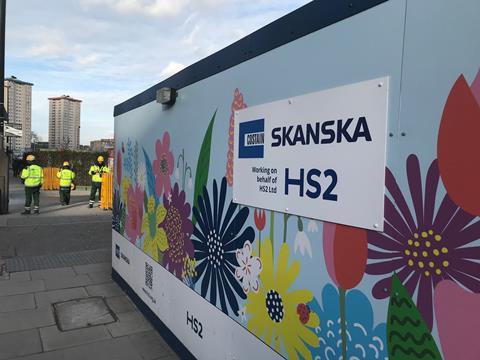Boris Johnson gave Europe’s largest rail project the nod this week but he still has cost concerns, which makes a proposal from a Chinese company all the more interesting
Contractors working on HS2 must have heaved a collective sigh of relief this week when the prime minister finally came off the fence in favour of the largest railway project in Europe.

Had the whole scheme been axed, industry leaders warned Boris Johnson that there was no back-up plan, no other shovel-ready projects that would have created the jobs and the boost to the economy he so badly needs in the year of Brexit. And the good news got better on Tuesday with the announcement of £5bn for other transport projects, something that was widely seen as a sweetening of the pill for staunch opponents of HS2 within the Conservative Party.
So, delight all round? Not quite. The government says it wants to proceed with the project in full, but it is pressing the pause button on the northern section going to Manchester and Leeds, known as phase 2. This is in line with Doug Oakervee’s recommendations but many in the industry will be rolling their eyes that his review has called for yet another review: just how much longer can a project that began life in 2009 be delayed?
Could the billions assigned to phase 2 of HS2 actually be funnelled into an expanded Northern Power House Rail programme?
Doubts over phase 2 are understandable. Unlike phase 1, no construction work has actually begun and the costs are less fixed. Pausing now will supposedly allow the government to drive down costs.
It is also easy to imagine that such a hiatus could allow the government more time to sell the project to its northern voters – could the billions assigned to phase 2 of HS2 actually be funnelled into an expanded Northern Power House Rail programme? If played right, then HS2 still gets delivered in full but the work on the northern section just comes under a different – and crucially northern – brand.
Political machinations aside, the arguments that have raged over HS2 mostly come down to a feeling that the public has been misled over the cost, first pegged at £43bn, then £56bn and now potentially £106bn. Was optimism bias to blame? Or, as some insiders have alleged, were costs kept deliberately low to get the HS2 bill through parliament? Whatever the case, not being upfront about the true cost very nearly killed this project.
But perhaps there is a way to get the full-version, 21st-century high-speed railway that the UK needs and not bleed the country dry. Enter the Chinese and an offer to build and part-finance the whole project for close to the current £56bn budget – and in just five years.

Reports about an interest from China Railway Construction Corporation emerged last year when HS2 chief executive Mark Thurston met the firm in Beijing, but nothing appeared to come of it. Now Building has seen a letter suggesting that a different part of one of the biggest rail companies in the world – the 16th Bureau – has been in contact with Thurston as recently as last month.
On the face of it the 16th Bureau’s offer appears to be an incredible one: it claims to be able to finance up to 80% of the project, knock tens of billions of pounds from the budget, reach train speeds of 420km/h and slash the delivery time by introducing automated track-laying processes and carrying out construction in numerous locations simultaneously.
HS2 is understood to have told the Chinese that their proposal for phase 1 has come too late. But it is not a complete brush off.
It is certainly hard to imagine UK tier 1 contractors agreeing to a joint venture with a Chinese competitor
Instead HS2 has pointed to opportunities for station and track construction and suggesting they look into a joint venture with a UK tier 1 contractor. And it has very much left the door open for involvement in phase 2.
Is it likely that a company part-owned by the Chinese state will build even part of HS2? It is certainly hard to imagine UK tier 1 contractors agreeing to a joint venture with a Chinese competitor – and one that has the potential to disrupt the entire rail construction sector. To do so would lead to a row on similar proportions to the furore over Chinese telecoms firm Huawei’s bid to work on the UK’s 5G network.
Then again Huawei’s very success in this country should give UK construction companies pause for thought. What we do know is that overseas railway construction is a target market for Chinese firms and an HS2 contract, if secured, would be a huge prize.
Chloë McCulloch is the editor of Building




























No comments yet